The conference was the region’s first major event on LegalTech and Legal Innovation, a major milestone for the city. The event was held as part of the University of Manchester’s Law and Technology Initiative, which aims to bring together the broad community of legal innovators in and around the North West.
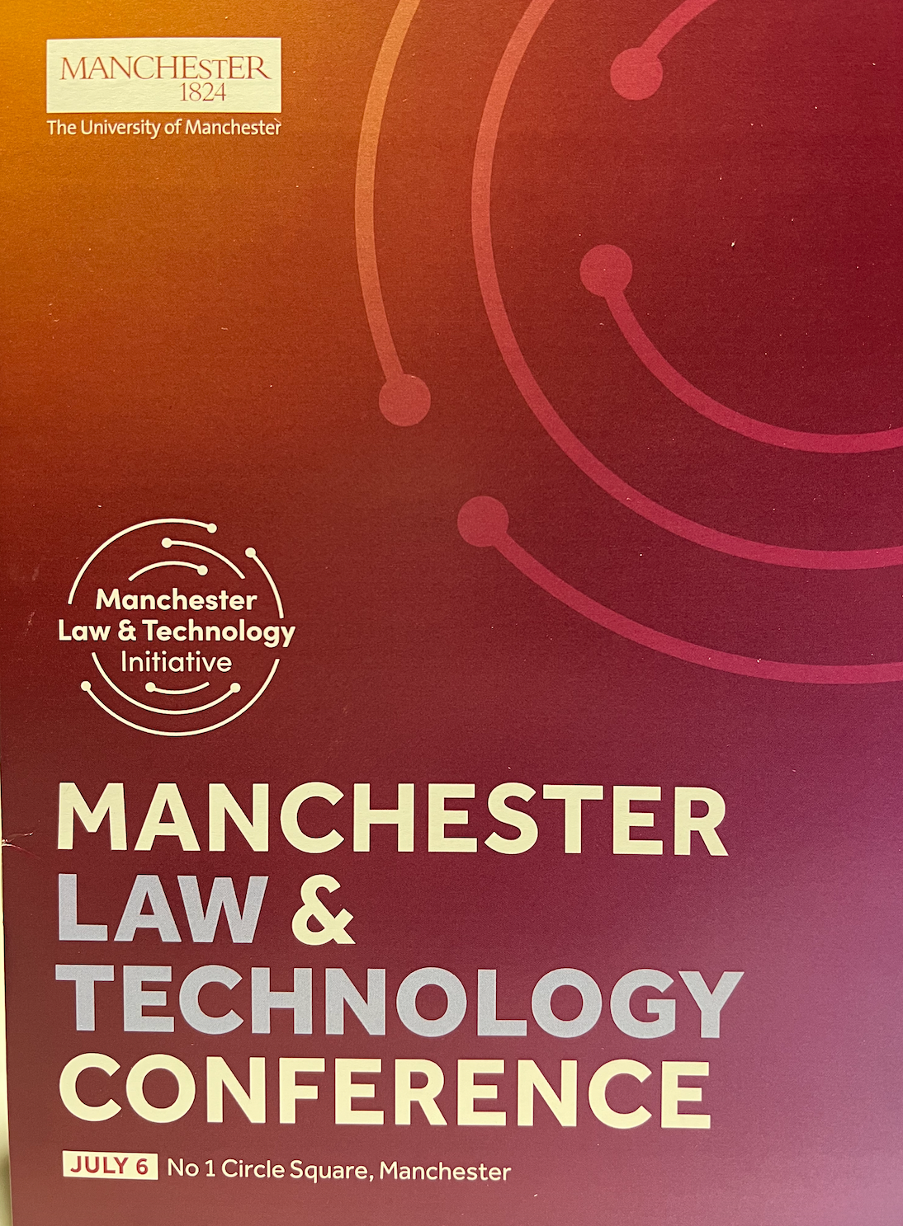
The conference kicked off with a welcome and overview of the initiative from Professor Orkun Akseli, Professor of Commercial Law at The University of Manchester Law School, who positioned The University of Manchester as a space in which participating stakeholders and University experts can examine some of the more challenging questions that are arising for the legal sector as a consequence of the emergence of new technologies.
This was followed by a keynote from Professor Teresa Rodríguez de las Heras Ballell, Universidad Carlos III de Madrid, who discussed the evolution of digital platforms and the creation of a new architecture for the legal sector, explaining how digital platforms operate as private legal entities through contractual agreements with users. She then went to highlight the impact that Artificial Intelligence (AI) is having on the legal sector, raising the questions surrounding liability and risk, something that is already being considered in EU legislation.
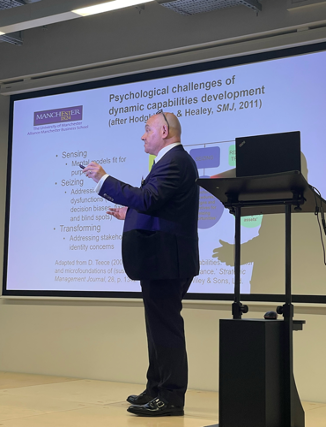 We then heard from Professor Gerard Hodgkinson, Vice Dean for Research at The University of Manchester who outlined some of the behavioural challenges associated with LegalTech, particularly the fear and resistance to change. In more detail, Gerard spoke to the following challenges:
We then heard from Professor Gerard Hodgkinson, Vice Dean for Research at The University of Manchester who outlined some of the behavioural challenges associated with LegalTech, particularly the fear and resistance to change. In more detail, Gerard spoke to the following challenges:
-
- Sensing – the subjectivity surrounding how individuals perceive and define risk.
- Seizing – decisional biases and outdated mental models.
- Transforming – managing stakeholders and taking them with us.
The first session concluded with a panel discussion chaired by Professor Gerard Hodgkinson and including Prof Teresa Rodríguez de las Heras Ballell, Jon Gregson, Product and Innovation Partner at Weightmans LLP, Jonathan Patterson, Managing Director at DWF Ventures; Adam Ryan Chief Legal Innovation Officer at Freshfields Bruckhaus Deringer LLP; Thomas Hinton, Senior Manager – Innovation & Legal Technology at Addleshaw Goddard LLP.
The panel first explored the challenge surrounding the resistance to adoption of technology within the legal sector, making specific reference to an Australian law firm that has been rewarding lawyers for increasing their efficiency and productivity through the use and adoption of technology. The panel also discussed AI and the fear of automated decision making, with one panellist stating, “AI is about getting lawyers the information they need to make a more informed and faster decision, AI is not about making the decision for them.”
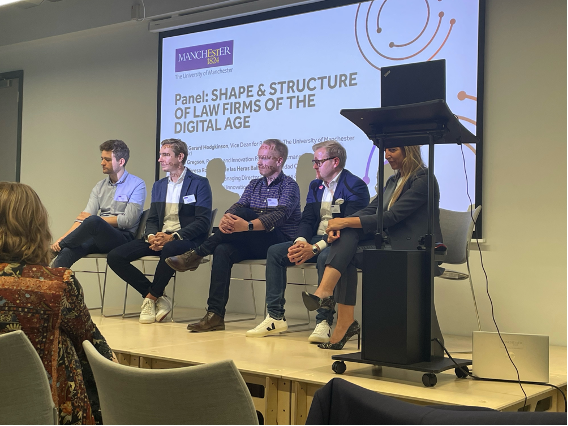
After a short break for coffee and networking, Stuart Whittle, Chief Technology and Innovation Officer at Weightmans LLP spoke about challenging the belief that process and automation leads to deskilling. Stuart said that through the increased adoption of technology and automation, law firms can eliminate the monotonous and repetitive elements of procedures that are fundamental to the task at hand, leaving lawyers more time to engage in value-add activities.
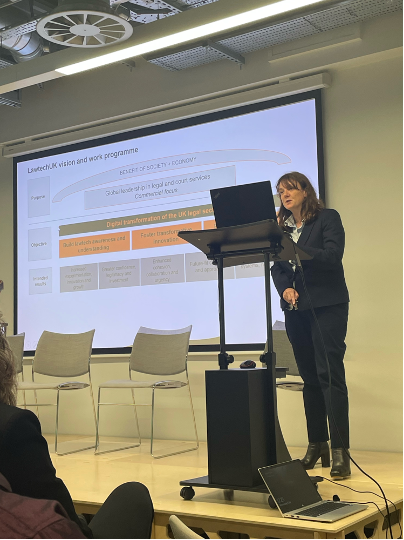 Following this, Prof Katie Atkinson from University of Liverpool gave an update from LawTech UK on some of its recent activity and developments in legal innovation. Katie outlined the overall vision for LawTech UK which focuses on the digital transformation of the UK legal sector, specifically building LawTech awareness/understanding and fostering transformative innovation. A number of LawTech initiatives were also discussed such as the LawTech Sandbox and the recent independent valuation report Shaping the Future of Law.
Following this, Prof Katie Atkinson from University of Liverpool gave an update from LawTech UK on some of its recent activity and developments in legal innovation. Katie outlined the overall vision for LawTech UK which focuses on the digital transformation of the UK legal sector, specifically building LawTech awareness/understanding and fostering transformative innovation. A number of LawTech initiatives were also discussed such as the LawTech Sandbox and the recent independent valuation report Shaping the Future of Law.
We then had a panel to conclude this session chaired by Deborah Walker from Midas and involving Jay Dunning, Innovation Lead at DWF, Joseph Lee, Reader in Corporate and Financial Law at The University of Manchester and Prof Katie Atkinson. The panel first discussed how the impact of the Covid-19 pandemic has accelerated the adoption of technology both amongst consumers but also law firms. Technology was referred to as the “last piece of the puzzle”, as law firms should first acknowledge the importance of people and process, seeing technology as an enabler rather than a problem solver. The conversation then moved on to the topic of skills with acceptance across the panel that everyone needs a certain level of digital awareness/foundation in order to compete in today’s market, with skills such as commercial awareness and empathy also being in demand.
The final session before lunch was from Brian Higgins, Security Consultant at SAS. Brian made the point that everyone is vulnerable to cyberattacks as they are becoming ever more sophisticated. Previously, cyberattacks were mostly carding crimes on online retail stores, now ransomware often provides the biggest threat to businesses and so education on cybersecurity across all functions of a business is important to prevent risk.
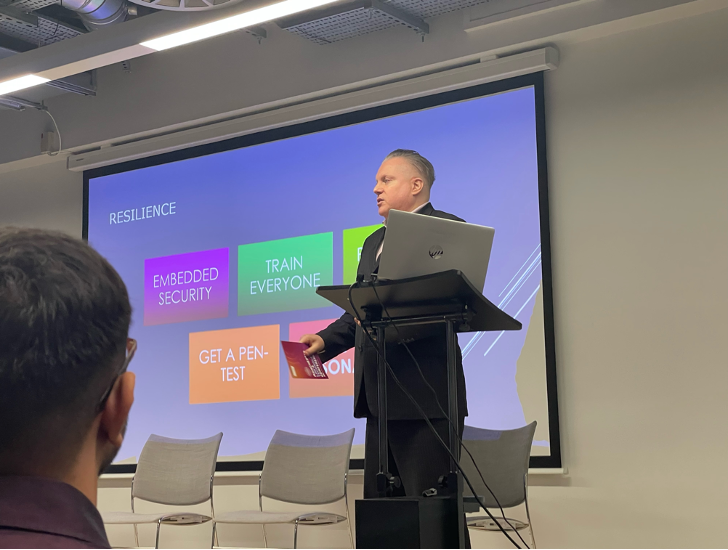
We enjoyed a chance to network over lunch before returning for a session from Eimear McCann, Commercial Director at TrialView. Eimear discussed the potential challenge of losing the ‘human element’, specifically the empathy that is crucial to dealing with legal disputes. Through advancements such as digital hearings and courtrooms, there is often a loss of social data such as a lack of eye contact, inattentional blindness and psychological distance which can all impact on the result/outcome of a case.
Next, we heard from Dan Sodergren from YourFlock who spoke about the increasing employee turnover in law firms. Dan suggested that benefits such as competitive pay and additional holidays may not be enough to retain employees and that intangible benefits such as praise, recognition and transparency are also important for preventing high staff turnover.
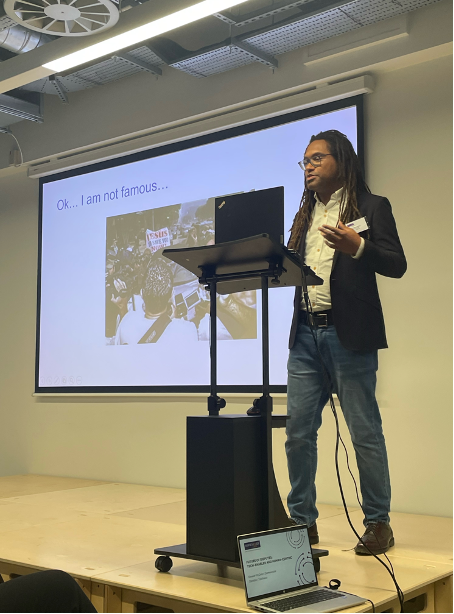
This session was concluded with a panel discussion chaired by Professor Orkun Akseli and involving Professor Claire McGourlay at The University of Manchester, Katy Sidebotham, Innovation Manager at DWF, James Whitaker, Senior Manager – Innovation & Legal Technology at Addleshaw Goddard LLP and Lewis Bretts COO and Chief Legal Engineer at SYKE who discussed in detail how academic and industry partnerships can create new and better recruitment models.
After a final coffee break, the day concluded with sessions from Jemma Fleetwood & Sam Ballin at JMW LLP on legalities and digital assets followed by Mike Kennedy, Senior Manager at Addleshaw Goddard LLP & Will Lloyd from Manchester Legal Hackers on how hackathons can facilitate innovation sprints.
Julian Wells and Chloe Thompson from Whitecap Consulting attended the event, presenting Whitecap and also the LegalTech in Leeds initiative we are involved in. LegalTech in Leeds aims to bring together the region’s legal and technology sectors to support the digital transformation of the legal sector; to help support tech entrepreneurs seeking to engage with the legal sector and to enhance access to legal services for consumers and businesses.
As part of the initiative, LegalTech in Leeds will continue to promote and align to LegalTech activity and developments regionally, nationally and internationally, including keeping abreast of developments with the Law and Technology Initiative at The University of Manchester which is doing a great job of flying the flag for LegalTech/LawTech in Manchester.
